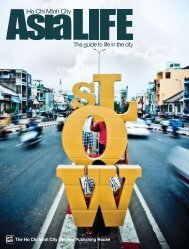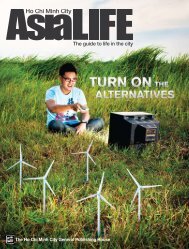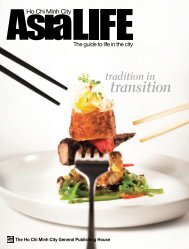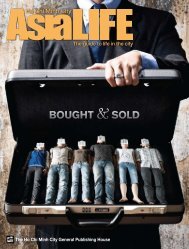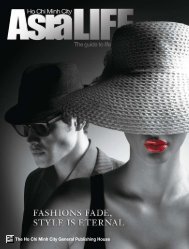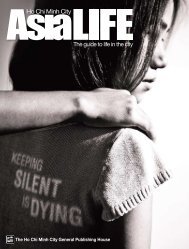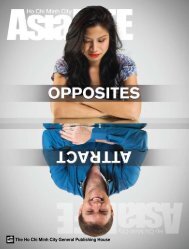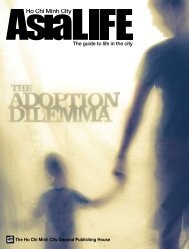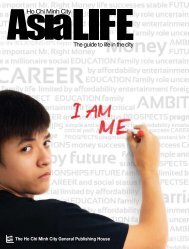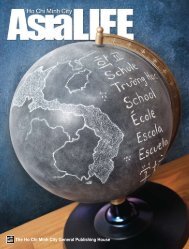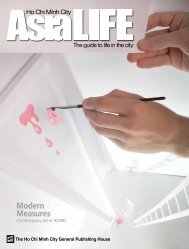asialife HCMC 1 - AsiaLIFE Magazine
asialife HCMC 1 - AsiaLIFE Magazine
asialife HCMC 1 - AsiaLIFE Magazine
You also want an ePaper? Increase the reach of your titles
YUMPU automatically turns print PDFs into web optimized ePapers that Google loves.
ookshelf<br />
Mary Ann in<br />
Autumn<br />
By Armistead Maupin<br />
Doubleday<br />
Fans of the beloved Tales of the City stories that first appeared<br />
in the San Francisco Chronicle in the 1970s before becoming<br />
novels will be thrilled to hear of the latest one, Mary Ann<br />
in Autumn, where the folks of 28 Barbary Lane are reunited,<br />
older and wiser—after a 21-year hiatus. Now in their fifties and<br />
dealing with issues related to aging—attending to a partner with<br />
Alzheimer’s—or infidelity as Mary Ann discovers her husband<br />
having an affair with her life coach on Skype so Maupin hasn’t<br />
lost his touch of keeping things culturally and technologically<br />
relevant. There’s a great deal of hilarity that one has come to associate<br />
with the Tales series: absurd plotlines and eccentric but<br />
lovable characters who are now navigating through traditional<br />
relationships in difficult times. Can this novel appeal to a newer<br />
generation perhaps unfamiliar with Maupin’s earlier work No.<br />
It’s strictly for those who have followed his work and are coming<br />
to terms with being unhip, much like the folks of Barbary Lane.<br />
Decoded<br />
By Jay Z<br />
Spiegel & Grau<br />
It's easy to think Jay Z's book (memoir cum social commentary<br />
on rap) is as glossy as everything else is in his life. The<br />
man remains guarded about his marriage to Beyonce so you<br />
may be right to assume that he's selective in his decoding of<br />
himself. However, Decoded is a brutally honest account by the<br />
rapper of his early life at least. Learning about how he began<br />
to write down rhymes from an early age, to his working the<br />
streets as a crack dealer to becoming the man who has more<br />
hits than Elvis Presley in a compelling manner makes this a<br />
fascinating read. It is poignant to read about how he wanted to<br />
"dirty up" the blockbuster song "Empire State of Mind", which<br />
is the new anthem to the city like Frank Sinatra's "New York,<br />
New York" was. The book is worth reading for an insight into<br />
the evolution rap with mentions of the greats in the industry as<br />
seen by Jay Z as well a long footnote section to understanding<br />
his own lyrical process.<br />
An Object of<br />
Beauty<br />
By Steve Martin<br />
Grand Central<br />
Is there anything Steve Martin can’t do—and that too effortlessly<br />
The comedian, actor, musician and accomplished<br />
writer weaves a tale around the art world in his new novel An<br />
Object of Beauty. Martin is no stranger to art as he owns an<br />
impressive collection, which includes Picasso, Seurat, Edward<br />
Hopper and de Kooning. Like his novella Shopgirl, Beauty<br />
centres around a young woman, Lacey Yaeger, but this heroine<br />
is fiercely ambitious in her quest to rise at Sotheby’s. We also<br />
meet artists, critics, buyers and are provided an entertaining<br />
insight into the art world, complete with artspeak. There is also<br />
a mystery element that runs through the plot, of an art theft that<br />
occurs, which adds pizzazz to the storyline. Martin’s observations<br />
on the art world today make for insightful reading—and<br />
given his background, there’s plenty of humour in it too. "New<br />
galleries sprouted in Chelsea overnight lacking only fungi<br />
domes," he astutely notes.<br />
Decision Point<br />
George W. Bush<br />
Crown Publishers<br />
The former president couldn't have chosen a better title to<br />
his autobiography as he waxes lyrical about major decision<br />
points in his life—from going sober in 1986, to running for<br />
government, to choosing to invade Iraq and why he made<br />
the choices he did during the financial crisis in 2008. He has<br />
ostensibly done this in the hope that his legacy is remembered<br />
as one that kept America safer—which is why he defends his<br />
decision to attack Iraq and sanction waterboarding suspects in<br />
Guantanamo Bay, to quote just two examples. He cites "being<br />
blindsided" by his government on frequent occasions, like Abu<br />
Ghraib. While it is poignant to read about the conversation<br />
between father and son during Christmas 2002, in which senior<br />
Bush tells junior about avoiding war, unless he has no other<br />
choice, there's still an impersonality to it. Perhaps the funniest<br />
moment in the book, is when he talks about taking his dog for<br />
a walk after retiring and having to pick up the poo himself.<br />
<strong>asialife</strong> <strong>HCMC</strong> 101



